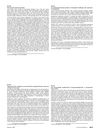TLDR The document concludes that HAIR-AN syndrome should be considered when a patient shows severe hyperandrogenism and insulin resistance after excluding tumors.
The document reports on a 20-year-old female diagnosed with HAIR-AN syndrome, which is characterized by severe hyperandrogenism, insulin resistance, and acanthosis nigricans. She exhibited symptoms such as secondary amenorrhea, severe hirsutism, virilization, clitoridic hypertrophy, frontal alopecia, and acanthosis nigricans, with testosteronemia levels at 1.28 ng/mL. No tumors were found on imaging studies. The diagnosis was made clinically due to resource limitations, after excluding tumoral causes and identifying insulin resistance. Treatment included androcur, estradiol pills, and lifestyle modifications. The case emphasizes the importance of considering HAIR-AN syndrome in patients with severe hyperandrogenism and insulin resistance once tumor causes are ruled out.
 9 citations
,
November 2013 in “Presse Medicale”
9 citations
,
November 2013 in “Presse Medicale” The document concludes that managing female hyperandrogenism requires a combination of identifying the cause, lifestyle changes, medication, and cosmetic treatments.
 2 citations
,
July 2012 in “Journal of Pediatric and Adolescent Gynecology”
2 citations
,
July 2012 in “Journal of Pediatric and Adolescent Gynecology” A 12-year-old girl with very high testosterone and insulin resistance improved with birth control pills, suggesting PCOS can cause high testosterone without tumors.
 378 citations
,
November 2011 in “Human reproduction update”
378 citations
,
November 2011 in “Human reproduction update” Experts recommend using evidence-based methods to diagnose and treat hirsutism, focusing on symptoms and underlying causes.
 1540 citations
,
October 2008 in “Fertility and Sterility”
1540 citations
,
October 2008 in “Fertility and Sterility” The report concludes that PCOS is mainly a condition of excess male hormones and its definition may change as new information is discovered.
 271 citations
,
December 2005 in “New England journal of medicine/The New England journal of medicine”
271 citations
,
December 2005 in “New England journal of medicine/The New England journal of medicine” The document likely offers guidance on treating a woman's excessive hair growth, considering her symptoms and obesity.
 July 2022 in “المجلة العراقية للصيدلة”
July 2022 in “المجلة العراقية للصيدلة” Most women with excessive hair growth (hirsutism) also experience a common type of non-scarring hair loss called Androgenetic alopecia with telogen effluvium.
 June 2021 in “International Journal of Research in Dermatology”
June 2021 in “International Journal of Research in Dermatology” Women with acne and PCOS should be checked for insulin resistance and related symptoms.
10 citations
,
March 2013 in “Bundesgesundheitsblatt - Gesundheitsforschung - Gesundheitsschutz” Obesity in children can worsen skin issues and increase infection risk.
 7 citations
,
January 2011 in “Journal of The American Academy of Dermatology”
7 citations
,
January 2011 in “Journal of The American Academy of Dermatology” Most women with hyperandrogenism first show acne, and skin conditions like hirsutism and acanthosis nigricans are good indicators of the condition.
 97 citations
,
July 2006 in “Dermatologic therapy”
97 citations
,
July 2006 in “Dermatologic therapy” The document concludes that accurate diagnosis and personalized treatment are important for skin problems in women with PCOS.
 43 citations
,
May 1988 in “British Journal of Dermatology”
43 citations
,
May 1988 in “British Journal of Dermatology” Patients with acanthosis nigricans often have insulin resistance and signs of increased male hormones, but treatment targeting these male hormones is generally ineffective.

The conclusion is that there's a link between high testosterone levels, insulin resistance, and certain skin conditions, regardless of obesity.











